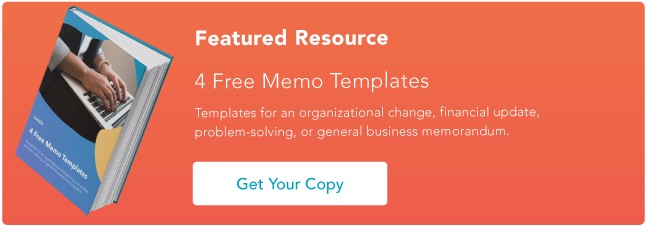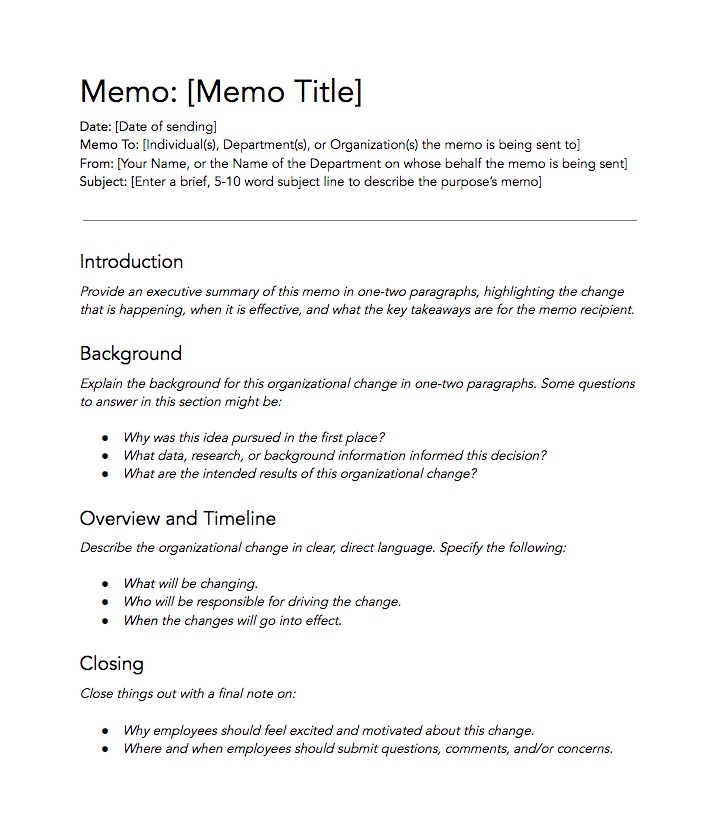A memo (also known as a memorandum, or "reminder") is used for internal communications regarding procedures or official business within an organization.
Unlike an email, a memo is a message you send to a large group of employees, like your entire department or everyone at the company. You might need to write a memo to inform staff of upcoming events, or broadcast internal changes.
If you need to inform your employees of official internal business, here's an easy-to-follow business memo template, as well as examples for further guidance.
Business Memo Template
MEMORANDUM
TO:
FROM:
DATE:
SUBJECT:
I'm writing to inform you that [reason for writing memo].
As our company continues to grow … [evidence or reason to support your opening paragraph].
Please let me know if you have any questions. In the meantime, I'd appreciate your cooperation as [official business information] takes place.
Header:
In your header, you'll want to clearly label your content "Memorandum" so your readers know exactly they're receiving. Then, you'll want to include "TO", "FROM", "DATE", and "SUBJECT". This information is relevant for providing content, like who you're addressing, and why.
Paragraph One:
In the first paragraph, you'll want to quickly and clearly state the purpose of your memo. You might begin your sentence with the phrase, "I'm writing to inform you … " or "I'm writing to request ... ". A memo is meant to be short, clear, and to-the-point. You'll want to deliver your most critical information upfront, and then use subsequent paragraphs as opportunities to dive into more detail.
Paragraph Two:
In the second paragraph, you'll want to provide context or supporting evidence. For instance, let's say your memo is informing the company of an internal re-organization. If this is the case, paragraph two should say something like, "As our company continues to grow, we've decided it makes more sense to separate our video production team from our content team. This way, those teams can focus more on their individual goals."
Paragraph Three:
In the third paragraph, you'll want to include your specific request of each employee — if you're planning a team outing, this is the space you'd include, "Please RSVP with dietary restrictions," or "Please email me with questions."
On the contrary, if you're informing staff of upcoming construction to the building, you might say, "I'd appreciate your cooperation during this time." Even if there isn't any specific action you expect from employees, it's helpful to include how you hope they'll handle the news and whether you expect them to do something in response to the memo.
Downloadable Memo Template
Want to see the above memo format in its final form? Download HubSpot's free business memo templates, shown below. The document gives you a framework that sorts your memorandum into subtopics to help employees better digest the information and understand what's expected of them after reading it.
Business Memo Template Format
The format depicted in the templates above is designed to effectively communicate your message. A memo should disseminate the necessary information in a way that is easy for a mass number of employees to digest.
An accurate subject line will alert them that this memo is relevant to them specifically. And beginning with an executive summary allows recipients to understand the general message before you dive deeper into the details. The background information offers context to the message, and the overview and timeline should answer questions that are likely to come up.
Business Memo Template Examples
Different industries or situations will require slightly different memos. Certain ones will need to be longer or shorter, others may not have a timeline, and some will have extensive background information. The format of your memo should change to fit the message you want your employees to receive.
Launch Delay Memo
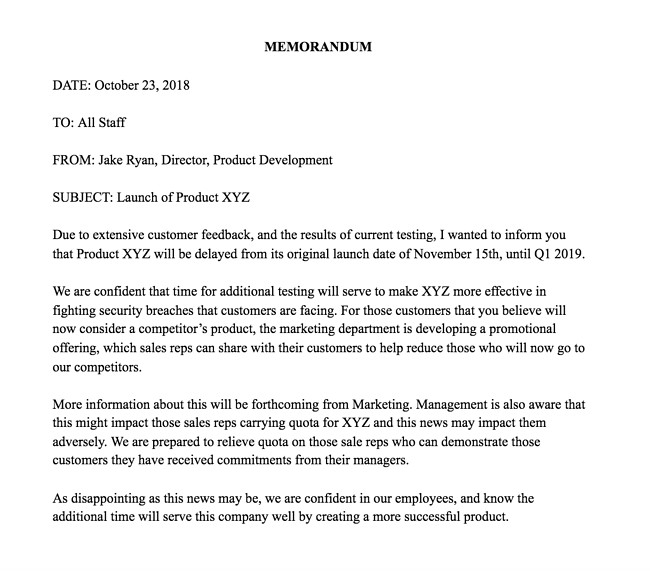
The objective of this memo is to announce that the launch of a product will be delayed. The introduction includes the new date, so a timeline or long overview isn’t necessary. This format of memo could be applied to other situations where a simple, but important, change is occurring. Other date changes, promotions, milestones, or product announcements could also utilize this format.
Building Update Memo
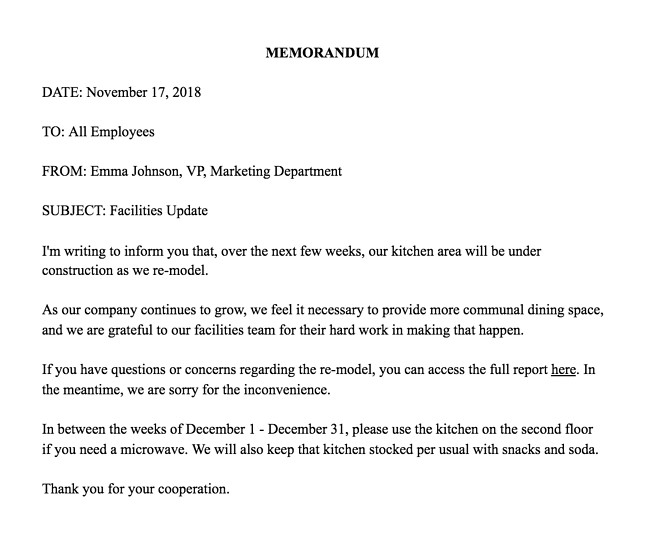
There are logistical aspects of a business that concern your employees, but don’t necessarily involve their work. This memo depicts an example about the kitchen in the office. It’s a bit of an inconvenience, but shouldn’t affect their work much. This could be applied to other building updates, work from home days, or other widespread but minor announcements.
Community Memo
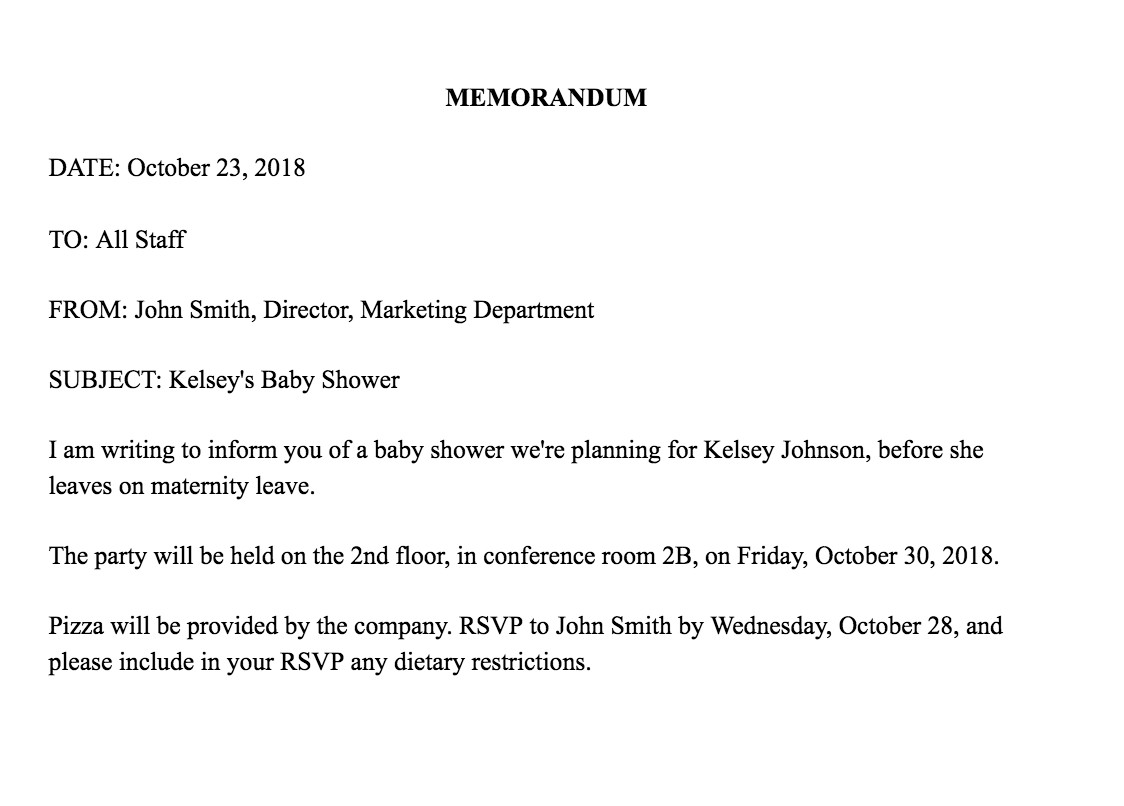
Celebrations, events, theme days, or other fun things for your employees can also be communicated through memos. Community memos like this example are generally shorter because they don’t require much background information or many details. These just need to include a summary, date, and location at minimum.
Write Your Memos To the Point
The main difference between a memo and just an email is not the level of complexity, it’s the size of the audience. A memo can be simple or intricate, as long as it effectively communicates your message and is relevant to the receiving group of employees. And the message itself should be clear and concise, no matter which memo format you use.
Editor's note: This post was originally published in October 2018 and has been updated for comprehensiveness.
